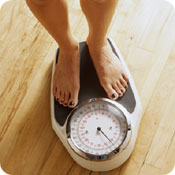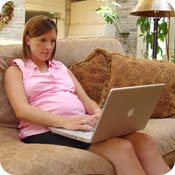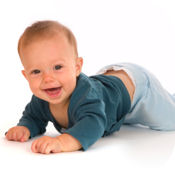|
Your Baby This Week Your baby is getting chubby. She weighs about 32 ounces (1 kg) and measures more than 9 inches (23 cm) in length. You're continuing to grow, too, which is a sign that you're both healthy! .jpg)
A pattern similar to life outside the womb is starting to develop. You may notice a distinct wake-sleep cycle, where periods of activity alternate with quiet times on a regular basis. Your baby's senses are coming into full bloom. She can't see yet, but she can hear, taste and feel, and her brainwave patterns are similar to those of a newborn. If your health care provider listens your baby's heartbeat now, he or she may notice a skipped beat, which is a condition known as an arrhythmia. Often this is normal and disappears as the heart matures. If it's still present when you are ready to deliver, a fetal heart rate monitor can detect any signs of distress. Your Body This Week Two thirds of your pregnancy is over, and you're really starting to feel the backaches, leg cramps and headaches more frequently as pressure within your pelvis builds. You'll continue to gain weight at the rate of about one pound (.45 kg) per week. As your baby grows, your uterus pushes up towards your ribs, which may feel sore. As uterine muscles stretch, you may occasionally feel a "stitch" in your side, similar to what happens when you run. But it won't be long now. Rest up, stay off your feet when you can, and get ready to be a mom! Making the Best of an Uncomfortable Situation Every day it's something new. If there's no heartburn, then you're constipated. If the morning sickness is gone for the day, it left a case of major fatigue in its wake. The list of pregnancy discomforts is a long one, and it may seem like there's no end in sight. The good news is that you can ease these discomforts and more with just a few nutrition choices and home remedies. The better news is that it can happen naturally, and in some surprising ways. Read more about natural cures for pregnancy symptoms. Handling Hurting Hips It would be nice if your pregnancy weight were distributed evenly throughout your body. But it doesn't happen that way. The hips and lower back are expected to "shoulder" most of the load, and the pressure can cause aches, soreness and downright pain. With good posture and sleeping positions, along with some exercises and stretches, you can alleviate some of that hip pain and get on with your normal day. Here are some hip-friendly exercises and stretches |
Week 26: Bid Your 2nd Trimester Adieu
Your Week-by-Week Guide to Pregnancy
Page 1 of 1





Member Comments